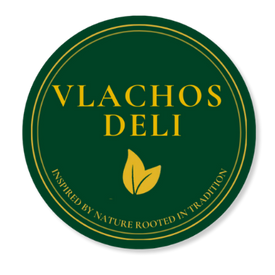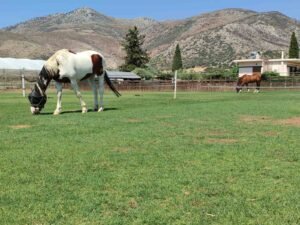Herbs and Horses:
From the rugged hills of ancient Greece to modern fields of holistic veterinary care, herbs have played a vital role in equine wellness. Horses and herbs have shared a long history—an intersection of natural wisdom, traditional healing, and evolving science. In this article, we explore how certain herbs, particularly Mediterranean staples like thyme, sage, and rosemary, have supported horse health throughout time and continue to be used today in both conventional and alternative therapies.
My Personal observation: Herbs to Horses
In Marathon, Greece, where I regularly practice equine acupuncture, I've had the opportunity to observe something fascinating. After treatments, one of the horse caretakers were offering the horses local herbal infusions made from Greek herbs like sage, thyme, and chamomile—all gathered from the fields surrounding the stables. He would steep these herbs in water, letting them cool, and then offer this aromatic mixture to the horses to drink.
While I was already familiar with how these herbs support human health, I hadn’t previously seen their effects on horses up close: To my surprise, the horses began to respond in subtle but consistent ways—appearing calmer, more alert, and more engaged—each according to the herb’s known properties.
This unexpected discovery opened my eyes to the synergistic potential of combining Traditional Chinese Veterinary Medicine (such as acupuncture) with Mediterranean herbal traditions. It’s a fusion of ancient wisdoms—one Eastern, one Western—that speaks to a more holistic, intuitive approach to animal wellness.
A Historical Bond: Horses, Herbs, and Greek Tradition
In ancient Greek mythology and veterinary practice, herbs were part of the daily care and medical protocols for warhorses and workhorses. Greek texts, such as those attributed to Hippocrates and later by Dioscorides in his seminal herbal pharmacopeia De Materia Medica, describe the use of aromatic and medicinal plants for both human and animal health.
Thyme (Thymus vulgaris) was often used for its antiseptic and respiratory properties. It was burned in stables for purification and added to feed in small quantities to support digestion and ward off parasites. Sage and chamomile were also commonly used to soothe digestive issues and calm anxiety in nervous animals.
In fact, many herbs considered staples in Greek cuisine—oregano, marjoram, and fennel—were originally used more often in animal care and folk remedies than in food!
Scientific Validity: What Modern Research Says
Today, many of the traditional uses of herbs in horses are supported by research:
- Thyme contains thymol, a compound with antibacterial, antifungal, and anti-inflammatory properties (Bounatirou et al., 2007). Thymol is now found in natural equine wound sprays, hoof treatments, and respiratory support supplements.
- Chamomile has been shown to reduce anxiety and gastrointestinal distress in mammals, making it a gentle calming agent for horses during transport or after surgery.
- Licorice root is often used for its soothing effect on the digestive system and mild adrenal support, particularly in horses prone to ulcers.
However, it’s important to use herbs in moderation and consult a veterinarian or equine herbalist before starting herbal supplementation. Some herbs can interfere with medications or be toxic in large quantities.
🧪 Vitamins & Nutrients in Key Herbs for Horses
| Herb | Key Nutrients | Benefits |
|---|---|---|
| Thyme | Vitamin C, Vitamin A, Iron | Immune support, respiratory aid, antiseptic |
| Sage | Vitamin K, B-complex | Anti-inflammatory, cognitive support |
| Chamomile | Apigenin, Flavonoids | Calming, digestive aid |
| Licorice | Glycyrrhizin, Flavonoids | Ulcer relief, adrenal support |
These herbs are typically given as teas, tinctures, dried powder, or as part of specially formulated supplements. Always verify safe dosage and compatibility with other medications.
Everyday Herbal Uses for Horses
- Respiratory Steam with Thyme: Add dried thyme to a bucket of hot water and let the horse inhale the vapors to help with congestion.
- Chamomile Infusion: Brew strong chamomile tea and add it to feed for anxious horses.
- Sage Poultice for Minor Skin Irritations: Crushed sage leaves mixed with warm water applied topically.
- Licorice Root Tea for Digestive Health: A gentle, soothing option for horses prone to ulcers or colic.
Final Thoughts
The bond between horses and herbs goes back centuries, blending ancient tradition with modern scientific understanding. Whether through the wisdom of the ancients or the validation of current research, natural remedies continue to offer meaningful ways to support the health and wellbeing of our equine companions.
Vlachou Panagiota
Certified Beekeeper | Specializing in Traditional Beekeeping & Natural Wellness Methods
Trained in Traditional Acupuncture – Academy of Traditional & Chinese Medicine
Member of the Beekeepers’ Association of Attica-Greece
Disclaimer: This article is for informational purposes only and does not substitute for professional veterinary advice. Always consult a qualified veterinarian before using herbs with animals.


